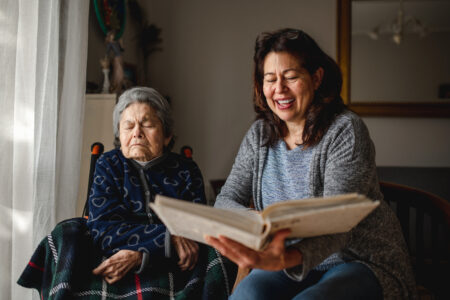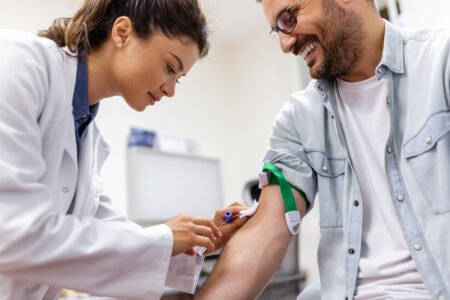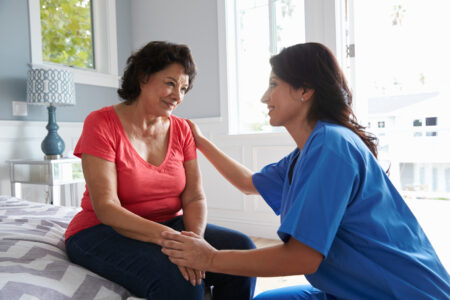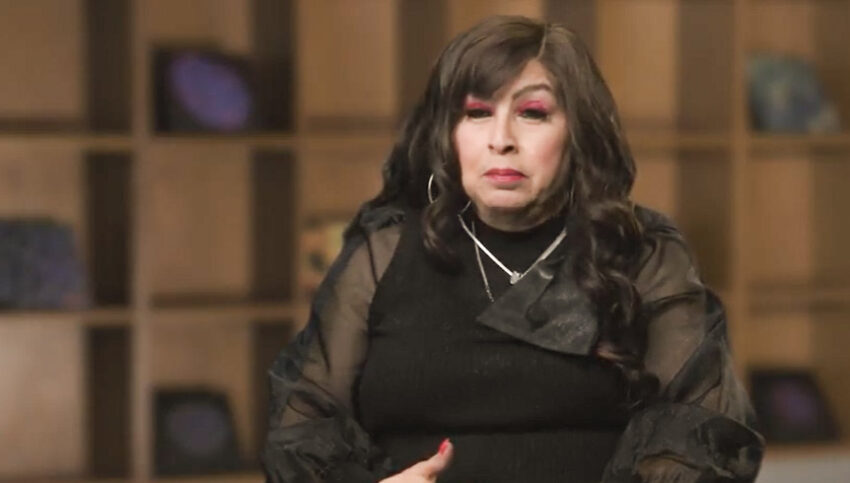
Share On Social!
When asked about achievements in her life, Diana Lopez of San Antonio, Texas, didn’t have to think long about her answer.
Surviving cancer.
Lopez was diagnosed with breast cancer at age 42. Like many of those who are diagnosed, it was a shock to Lopez and her loved ones.
“At the time I was scared because you think, they tell you, ‘You have cancer’ and you are like, ‘I’m going to die,’” Lopez said.
With the help of a clinical trial – a study with volunteers that helps researchers learn how to slow, manage, and treat diseases like cancer –Lopez stayed strong and continued to fight, no matter the obstacle.
A Cancer Diagnosis and its Impact
Lopez discovered a lump on her breast.
At first, she thought nothing of it.
“I wasn’t hurting or anything. It was just like a little ball that I felt but back then. I guess I was not educated enough to say, ‘You know what, I am going to check it out now.’ So, I waited almost a year,” Lopez said.
Once Lopez had finally brought it up to her doctor in 2008, she was sent to the Mays Cancer Center at UT Health San Antonio to get it checked out.
“It came back that it was cancer and it had gotten bigger,” Lopez said.
Lopez would receive surgery, where her doctors would discover something more.
“They removed my breast. On the back of the breast, they found melanoma,” Lopez said.
Lopez is a mother. At the time she had a young son, a daughter, and grandchild on the way.
“I’m going to have my little, you know, baby and who is going to take care of him the way I do?” Lopez said. “He could have been with his dad or with my daughter, but the love of a mother.”
To add to the Lopez’s hard situation, chemotherapy and other treatments weren’t easy for Lopez. She faced a lot of physical aches and pains.
“My daughter and my son-in-law had to literally carry me, bring me to the hospital, you know, for my treatments. Cause I couldn’t walk because they were so painful. And so, a lot of times you want to give up because you’re in so much pain,” Lopez said.
Despite her challenges, Lopez didn’t quit fighting.
“I have a little one, you know, I have my daughter, my grandkids. So, you fight, you fight, and you fight. A lot of times that’s your strength,” Lopez said.
The Decision to Participate in a Clinical Trial
While going through treatment, her doctor shared with Lopez the option of volunteering for a clinical trial.
Before she got cancer, she didn’t fully understand clinical trials.
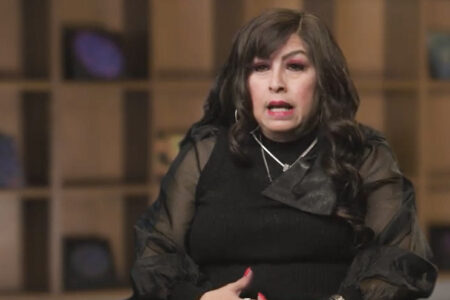
“I would hear about them and stuff. But it’s unfortunate that we hear about them but we really like don’t pay attention to them until it hits close to home,” Lopez said. “So, when they brought it up to my attention, of course, if it’s going to help me, if it’s going to benefit me, I will take the risk. Because we don’t know what is going to happen.”
Lopez considered many factors before deciding to participate.
“My family. And if it was gonna help me to, to cure me of cancer, of course, that was one of the main things. I just wanted to get cured, you know,” Lopez said. “And benefit other people in the long run, in the future. Other persons like me.”
There was also uncertainty about the impact of the trial.
“[Lopez] didn’t know what the side effects were going to be, participating in it or, if it was actually going to help me or not,” Lopez said.
However, after much consideration and talking with her doctors, and encouragement from her family, Lopez made the decision to join.
“My daughter was my rock. You know, she was the one that we would discuss [about the clinical trial]. She would be the one that would come with me, you know, a lot of times to my, to my chemos. And so, and she was just like, ‘Just do it, mom. If it’s going to help you, I’d rather you do it,’” Lopez said.
The Importance of Educating Yourself on Clinical Trials
She often got questions from friends about why she chose a clinical trial.
“Throughout the years, as I mentioned to friends, coworkers, and stuff that I participated, I think that the feedback I would get from them was like, ‘Why would you want to be a Guinea pig? Why would you want to? If they’re not even sure [ the trial will work], why would you even want to go there?’” Lopez said. “But my response was, ‘You know, I already have cancer.’”
Lopez credits the clinical trial for helping her defeat cancer. Today she is cancer-free.
“To me, I feel like it helped me, because I’m here,” Lopez said.
While she found it hard to put it into words, Lopez views participating in a clinical trial as a good experience.
“It was working, like I was getting better, you know, better and better. So, I mean, I find that a good experience,” Lopez said.
Lopez also highlighted the importance of research and getting all the necessary information from her doctor.
“You just have to educate yourself and if you trust your doctors and they’re telling you the truth, then the easier it’ll be for you to accept it or to participate,” Lopez said.
Lopez now encourages her friends and family to consider volunteering in a clinical trial if given the opportunity.
“You want to do anything that’s gonna help you to survive. A lot of people would say that like, ‘No, I wouldn’t participate.’ And I said, ‘I would do it again,’” Lopez said.
Lopez also continued to put her health first, going in for monthly follow-ups.
She added that she previously got a genetic test to determine if her cancer was hereditary. Thankfully, the results were negative.
“I was like, so happy. I told my daughter, I was concerned about her and my cause I have three granddaughters,” Lopez said.
The Best Support System for a Cancer Journey
Lopez spoke of how the support and help from her family really helped her while she was sick.
“They did take it really hard, but, as they saw me, and I would get really sick and then I would come right back,” Lopez said. “I would fight it and I would fight it and I’d be like, ‘No, I can’t let myself go. I cannot.’ So, my brothers were all like … ‘You’re a little firecracker.’”
She said her family support was big for her choice of a cancer clinical trial.
“My kids, I was willing to do anything to help me take care of myself, you know, to be here for them,” Lopez said.
It’s clear that Lopez loves her family. Through her tough times, they too were there for her.
“From my family, I never got any negative feedback. It was mostly, they would tell me … ‘We can’t make this decision for you, you have to do it on your own,’” Lopez said.
Even through hard treatments, her family helped her see the positives.
“I would be real sick. And I will come for chemo with makeup. And, you know, she would, you know, put makeup on me and well, my lashes and everything, everything had fallen off, you know, I, she would put eyelashes and I wear them all the time,” Lopez said.
Lopez was motivated and continued to embrace the beauty of her journey, embracing the option of wigs when experiencing hair loss.
“I love them. I’m like, ‘You know what? Who cares? You know? So, I shaved my head, the little hair that I get, I shave it,” Lopez said. “I’m not ashamed to tell them, ‘Hey, I had breast cancer, I went through this. And I wear wigs.’”
Find A Clinical Trial That’s Right for You!
Lopez hopes that her story inspires others to consider the option of clinical trials.
“I believe that stories like this will help people to consider it and do participate,” Lopez said.
Searching for the right clinical trial for you or someone in your familia?
Look no further than the Salud America! clinical trials page.
Our Salud America! team, led by Dr. Amelie G. Ramirez of UT Health San Antonio, is sharing open clinical trials and uplifting the voices and stories of Latinos who have participated in clinical trials to encourage Latinos to volunteer. This work is supported by a grant from Genentech, a member of the Roche Group.
“Latinos in clinical trials are not only helping themselves, but they’re also building a future with better treatments that can help their families in the future,” Ramirez said.
Visit the Salud America! clinical trials page to learn more about volunteer opportunities and how you and your familia can participate.
Explore More:
Clinical TrialsBy The Numbers
142
Percent
Expected rise in Latino cancer cases in coming years
This success story was produced by Salud America! with support from the Robert Wood Johnson Foundation.
The stories are intended for educational and informative purposes. References to specific policymakers, individuals, schools, policies, or companies have been included solely to advance these purposes and do not constitute an endorsement, sponsorship, or recommendation. Stories are based on and told by real community members and are the opinions and views of the individuals whose stories are told. Organization and activities described were not supported by Salud America! or the Robert Wood Johnson Foundation and do not necessarily represent the views of Salud America! or the Robert Wood Johnson Foundation.

